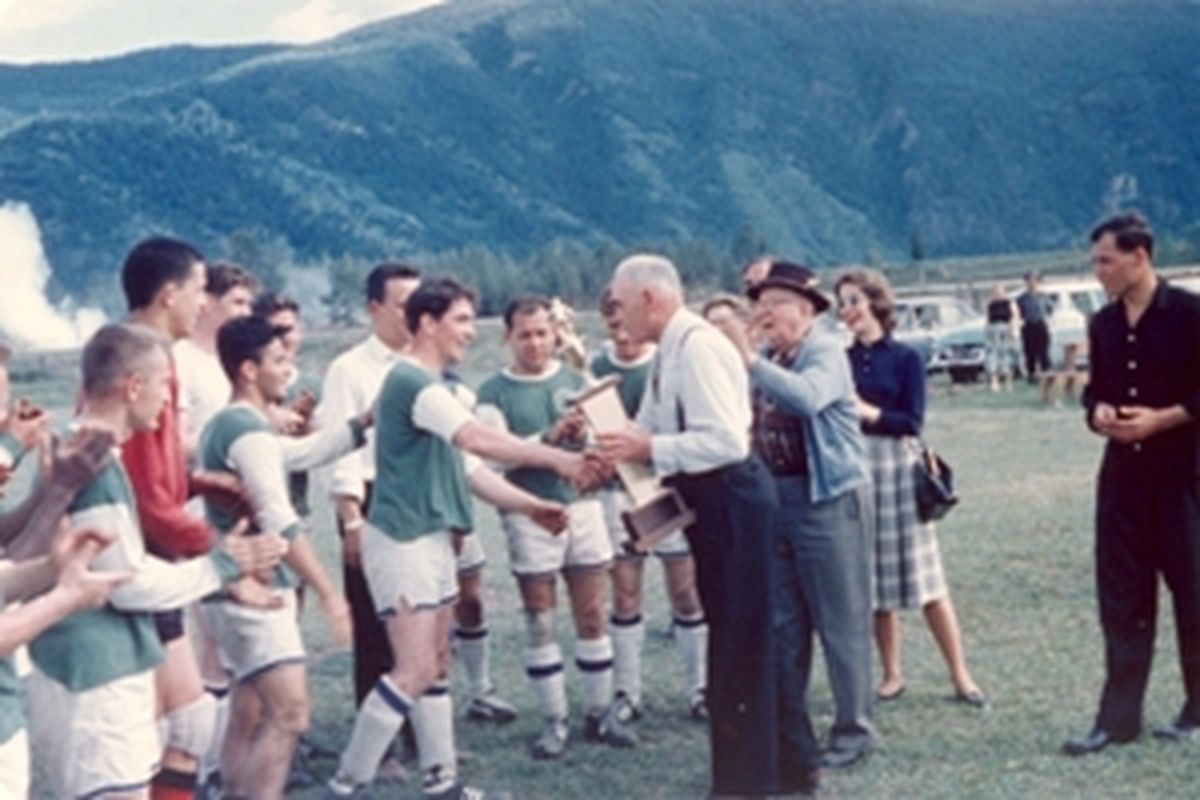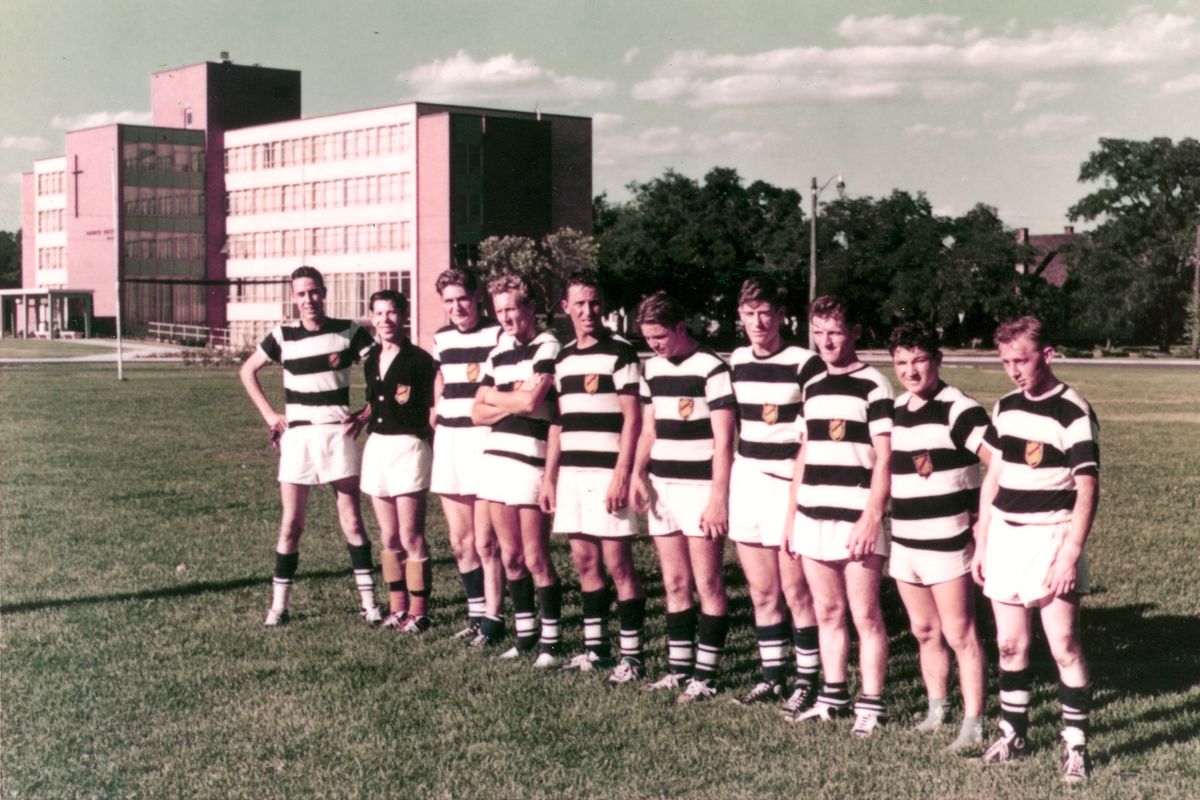Sharing memories of dead father’s prime time on soccer field
Photo of Spokane Spokes at soccer championship in Canada in 1962. (Photo courtesy of Anna Hintyesz)
Matthew told the man he never had played soccer but that his father, a German immigrant, had been on Spokane’s first soccer team.
“The Spokane Spokes?” the man asked.
Yes, that very team.
The man told Matthew that he had watched the Spokes play as a boy and later, he even played with them for a short while.
The coincidental meeting opened up this chapter of Spokane sports history: More than 50 years ago, young immigrants from war-weary Europe introduced the strange game of soccer to the Inland Northwest.
Matthew is 33. He was just 14 when his father died of a stroke in 1993.
This Father’s Day, thanks to former Spokane Spokes team members, Matthew knows much more about Spokane’s first real soccer team and about the days long ago when his father, Adam Deutsch, was at the top of his game.
• • •
Adam was born, the youngest of eight children, in 1937 in the Ukraine, where the Germans had settled since the 16th century. Europe was on the edge of war, and things were tense between the Russians and the Germans.
When Adam was 11 months old, his father was sent to prison in Siberia. He never returned.
Adam’s family made their way to Germany, and in 1951 left Europe for the United States, ultimately settling in Spokane – which already boasted a strong German-American community, drawn here at the turn of the century by farming.
The Herzogs, now a large and well-known German-American family, survived a harrowing journey out of the Ukraine into Germany. After the war, they eventually settled in Spokane, too.
The Herzog boys – Willi, Hans, Alex and Mike – grew up on soccer in Germany. During the war years, boys in neighborhoods fashioned soccer balls out of rags tied with string.
“I was 9 when I came to this country,” said Mike Herzog, 67, the youngest of the brothers. “I went to school and at recess, kids would hand me this strange ball (a football) and then jump on me.”
The new immigrants missed soccer, a game still novel in the United States in the 1950s, despite a 1920s effort to introduce it into Spokane’s elementary schools.
Bob Johnson, sports editor of the Spokane Daily Chronicle, wrote a 1961 column reminiscing about a 1926 “title” game at Glover Field on the Spokane River. His team wore heavy boots.
“Our theory was that the heavier the shoe the harder the ball could be kicked,” Johnson wrote.
Soccer pretty much disappeared here until 1957 when Karl Hoffmann of Spokane, now 76, was sitting around the German-American Club downtown drinking beer with buddy Fred Kirstein. They missed playing soccer.
“We said, ‘Let’s call around and see if we can get a team together,’ ” Hoffmann remembered.
Soon, German, Hungarian, Scottish and Dutch immigrants formed the Spokane Spokes. The team practiced at the old football field on the Gonzaga University campus. Soccer balls flew into the sawmill on the Spokane River below.
In the beginning, the men played against one another and against a fledgling GU soccer team.
“When they started off, they had only one ball, and it broke each time they played. My husband was a shoemaker by trade and he would sew it after every game,” remembered Anna Hintyesz, widow of Stephan Hintyesz, one of the original team members.
The players were in their 20s, and a number of them worked at Artistic Iron Works, owned by a German immigrant, Ernie Toll. When the team later moved its practices and games to Franklin Park, the company built the goal posts.
By the early 1960s, the Spokane Spokes were traveling regularly to Canada, winning tournaments and garnering recognition in the newspapers.
Mike’s older brother, Hans Herzog, remembered: “We’d drop some beer in the creek on the way up to Canada and on the way back, the beer was cool and we’d stop and have a picnic.
“The (Artistic Iron Works) boss was always mad at us on Monday, because we’d come in, dragging and injured and half able to work, and he’d say: ‘Damn soccer players.’ ”
The Trail, B.C., team was made up of Italians.
“They didn’t like Germans, and so now and then, they’d have a little fight along the sidelines,” said Hans, 75.
At Sunday games at Franklin Park, the families of the Spokane Spokes would gather, Hungarians, Scots, Germans and the Dutch, and cheer their young men on, sharing food and stories, strangers together in a strange land.
“Soccer,” Mike Herzog said, “was the universal language.”
• • •
One of the only photos of Adam Deutsch playing soccer shows him in the middle of the field at GU. His legs are strong and muscular, his smile confident.
The photo was taken in 1959, when Adam returned from the Marines. When he enlisted in 1956, the Spokane Daily Chronicle ran his photo and a brief article that read: “Deutsch said he enlisted in the Marines as the best way to express his loyalty and gratitude to the American people who made it possible for him to come here.”
Last week, Karl Hoffmann reminisced about Adam with Matthew.
“He got a spot on the team right away,” Hoffmann said. “He was a very aggressive player. He was very fast and very physical.
“He always had a smile on his face. He was ready to go. There was no hesitation. He wasn’t a guy who hung back. He had a go-go personality.
“That’s why it was a shock he developed the (health) problems he did.”
Adam suffered with hereditary high blood pressure and had a stroke in 1962, at age 25. Though he recovered well enough to work, marry my sister in 1972 and raise three children, Adam’s health was never the same.
Last month, Matthew met in person with Mike Herzog, a longtime English professor at GU, now chief of staff to the university president.
Herzog, who played on the Spokes from 1960 to 1964, has coached soccer all his adult life.
“When I started coaching the little kids 30 years ago, I was one of very few who had ever played the game,” he told Matthew.
The Spokes apparently remained in existence until at least 1976, when the last mention of the team in the newspaper archives listed the summer schedule for the Inland Empire Soccer League, a 12-team league.
Herzog said the level of expertise exploded here in the late 1980s, leading to a soccer culture so popular now that it’s challenging to find enough fields.
“A good high school player right now is certainly in better shape, has had better coaching and was probably better than most of our players were then,” he said.
In the 1990s, Matthew and his brother, Joe, played basketball at Medical Lake High School. They never tried soccer, despite their father’s gift of a soccer ball each Christmas.
Joe would wake Matthew up at 5 a.m. to practice and when they’d walk in the house afterward, Adam would look at his tall, lanky boys and say: “When I was playing soccer, my legs used to touch. Your legs are like birds!”
Matthew told Herzog: “This was his sentiment: Soccer players were stronger.”
When you lose a father at a young age, you play the “what if” game.
What if Adam were still alive to watch the grandson named for him, 11-year-old Adam Deutsch, play soccer?
What if Adam could give his son Matthew coaching advice?
Herzog told Matthew: “I don’t think he’d have advice for you. Soccer then was something you just went out and did. You didn’t think about it.”
Later Matthew reflected about his dad: “He used to watch soccer on TV. He’d preach soccer. Now I see why. It’s a team effort.”
And five decades after the Spokane Spokes disappeared into history, soccer players came together once more to share memories with the son of a fellow player.
One fine and final team effort, a Father’s Day gift for a son whose dad left the game too soon.

